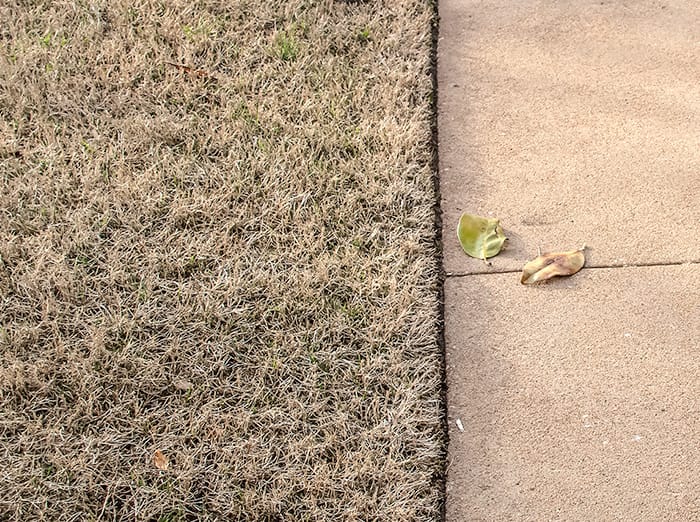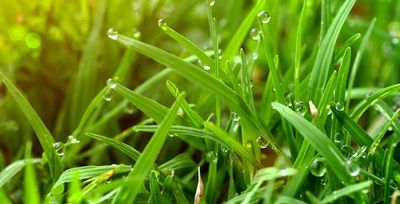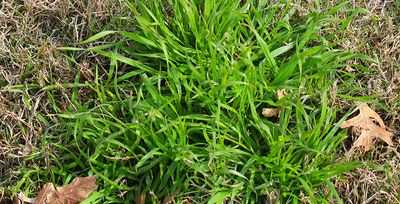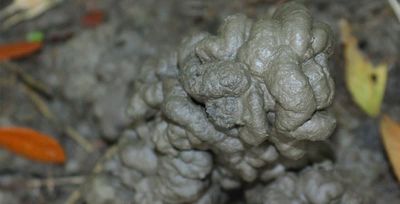Hot summer days, drought conditions, lengthy storms, oversaturation, and dropping nighttime temperatures during winter all challenge Tulsa lawns. Perhaps you’ve noticed. Even well-tended lawns can have weather-related stresses. Keep reading if you’re getting frustrated with your lawn not looking how you want it to. We will discuss the best strategy for protecting your grass from extreme Tulsa weather patterns. As always, we’re here if you need direct assistance. Nutri-Green’s local lawn care experts are a phone call or an email away. Reach out anytime. We’re here to provide advice and service options.

Watering your lawn
Your lawn needs water, but too much of a good thing is terrible. Giving your lawn the appropriate amount of water every season is essential.
Dry grass
Tulsa lawns can dry out and start to turn brown during the summer heat. If your lawn goes without water from natural resources, you can step in and provide it. A few strategically placed sprinklers can give your lawn the water it needs. Remember, other issues can cause your grass to look dry, such as diseases, pests, depleted soil, etc. Contact us if the water isn’t correcting the problem.
Overwatering
Overwatering can lead to lawn disease. First, oversaturated soil prevents oxygen from reaching the roots of your grass. When your grass doesn’t get enough oxygen, the blades weaken and aren’t strong enough to resist disease. Second, overwatering causes grass blades to stay damp. Floating spores in the air can cling to the blades, and disease can take root.
Prevention tips to combat dry grass and overwatering
- Consider the season and weather conditions. In hot weather, you need to water more. Pull back your watering efforts in cold weather or when the rain storms come.
- Water your lawn in the morning to allow it to soak into the soil before it has the chance to evaporate. It is imperative to water appropriately during hot weeks and periods of drought. Plus, watering in the morning allows the grass blades to dry in the sun, preventing overnight moisture and fungal growth.
- Water deeply and infrequently. Your lawn needs about an inch of water each week. You want that water in the soil, drawn up by the roots—not constantly soaking above-ground vegetation.
For more watering tips, check out our article, Proper Watering Maintenance.
Watering your lawn will help promote deep roots and a lawn resistant to drought conditions, pest problems, diseases, fungus, and other challenges. Remember that professional lawn care services can support your efforts by providing the essentials for healthy grass: fertilization, weed control, aeration, and more.
A healthy lawn can withstand extreme weather conditions. Your efforts begin with proper watering.
Choosing the right grass for your Tulsa lawn
There are two grass types: warm-season and cool-season. Which is best for Tulsa lawns? It depends on which benefits you want.
Warm-season grasses are resilient when temperatures are high, and they are better at dealing with drought. But they grow dormant during the winter months. Bermudagrass and Zoysia grass are two of the most popular warm-season grasses in our region.
Cool-season grasses can stay green year-round and may not grow dormant during winter if properly maintained. Kentucky bluegrass and tall fescue are two cool-season grasses often planted in Tulsa and throughout the area.
How does knowing what kind of grass you have help you protect your Tulsa lawn from extreme weather? Knowing the type of grass on your property can be crucial in protecting it from extreme weather. Different grass types have varying tolerance levels to heat, drought, and cold. For example, cool-season grasses like fescue thrive in the spring and fall but can struggle during the hot, dry summer months. On the other hand, warm-season grasses like Bermuda are more drought-tolerant and handle the summer heat better but may go dormant in the winter.
By understanding your grass type, you can take steps to care for it properly, such as adjusting watering schedules, fertilizing at the correct times, and overseeding when its best. This knowledge helps you maintain a healthy lawn that can better withstand the challenges of extreme weather, whether it’s summer heat or winter cold and ensures it’s resilient year-round.
When to call a professional lawn care company
Your lawn is constantly under attack for diseases, fungus, pests, weeds, and more. The best defense for your yard is a good offense. At Nutri-Green Lawn Care, we offer the best lawn care services in Tulsa and throughout Eastern Oklahoma, and our team gives lawns what they need to thrive, regardless of the weather conditions.
- Fertilization to nourish your grass
- Pre-emergent weed control to prevent weeds
- Post-emergent weed control to deal with weeds that have already taken root
- Annual soil pH testing to make sure your soil is getting the proper nutrients
- Overseeding to fill in thin areas or bolster strength in weak areas
- Aeration to open pathways for air, water, and nutrients
We begin your lawn care with a 21-point analysis and share our findings with you. Our experts tell you exactly what your lawn needs to stay healthy all year long and maintain its lush green beauty.
Contact us today to learn more. It’s time to start having the beautiful lawn you’ve always wanted.

Testimonials



News, Blogs & Articles
Our Blog













